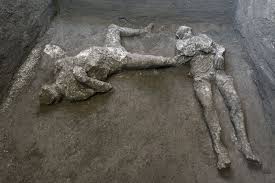Italy: Pompeii unearths bodies of master and slave

Rome: The skeletal remains of two men, believed to be a master and his slave, have been discovered at Pompeii, the ancient Roman city buried in volcanic ash and pumice after the eruption of Mount Vesuvius in 79 AD.
The bodies of the two men, scalded to death almost 2,000 years ago, are in an exceptionally well-preserved condition, reports Italian news agency ANSA.
One of the bodies was likely a man of high status, aged between 30 and 40, who still bore traces of a woollen cloak over his shoulders, in addition to a tunic.
The second, probably aged 18 to 25, wore a short, pleated tunic and had a number of compressed vertebrae, suggesting that he had been a manual labourer or a slave.
The bodies were unearthed in an underground chamber of a large villa at Civita Giuliana, in the outskirts of the ancient city.
The discovery, announced by the Italian culture ministry, has been described as “truly exceptional” by Massimo Osanna, the outgoing director of the Pompeii archaeological park which is currently closed to the public due to the covid-19 crisis.
“These two victims were perhaps seeking refuge when they were swept away by the pyroclastic current at about 9 in the morning” – said Osanna – “It is a death by thermal shock, as also demonstrated by their clenched feet and hands.”
Pompeii officials said the men apparently escaped the initial fall of ash before succumbing to a powerful volcanic blast that took place the next morning, reports the Associated Press.
After the men’s teeth and bones were preserved, the cavities left by their soft tissues were filled with liquid chalk that was left to harden before being excavated, reports Reuters.
The technique, whose end result resembles statues, shows the shape and position of the bodies in the throes of death.
“For the first time in over 150 years, ever since the first use of the technique, it has been possible not only to make perfectly matching casts of the victims, but also to investigate and document with new technologies the things they had with them at the moment they were engulfed and killed by the eruption’s boiling vapours,” Osanna told ANSA.





